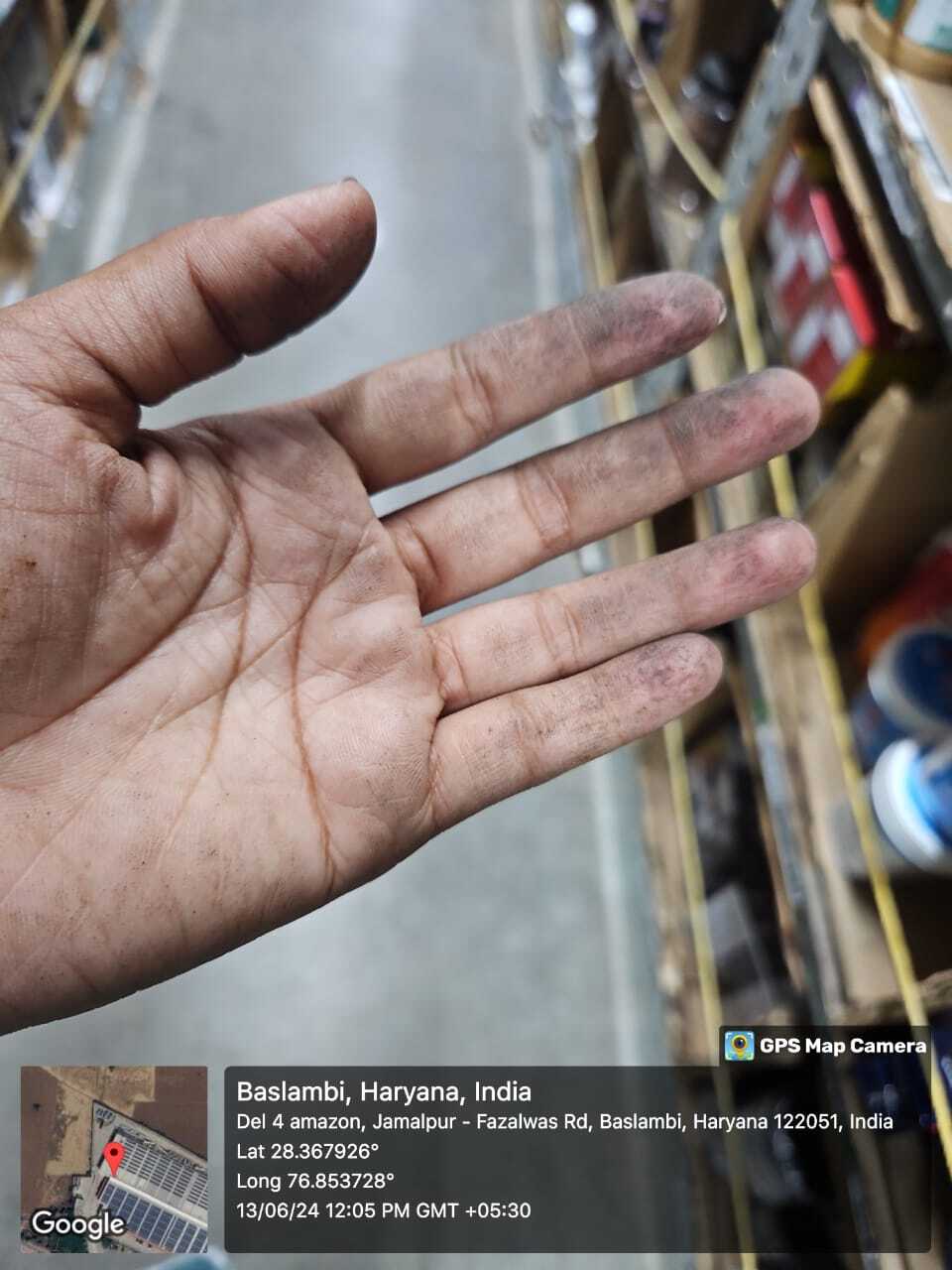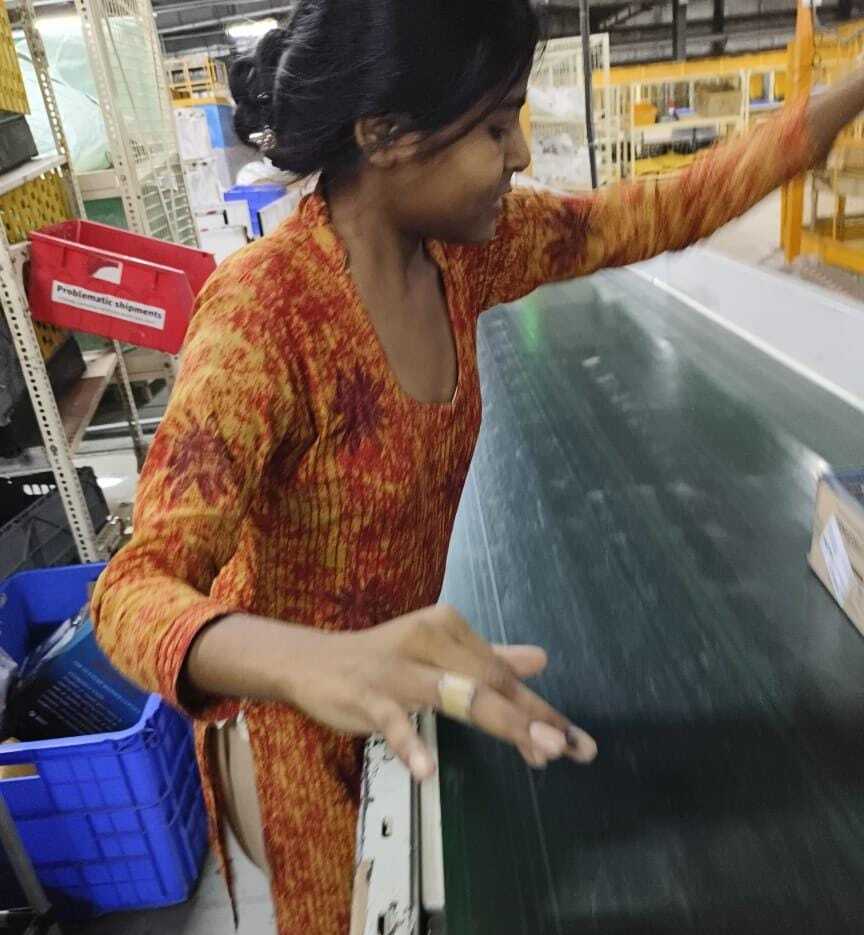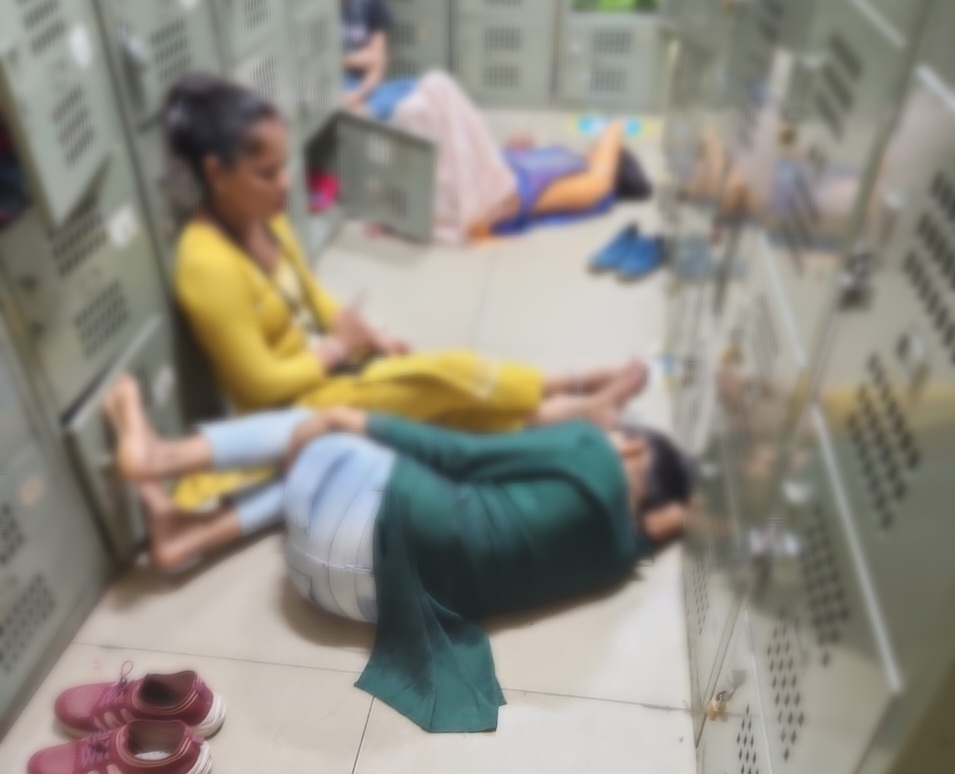The National Human Rights Commission (NHRC) has taken a suo moto cognisance of the media reports on the alleged inhuman and difficult working conditions of workers employed in Amazon warehouses. The move by the NHRC comes following the media reports that revealed that Amazon employees working at the company warehouse in Manesar, Haryana were compelled to take an oath to not take toilet or water breaks during the record-breaking heat in May 2024.
For the past several weeks, workers working at the Manesar warehouse have been in the news complaining about the lack of water and toilets as they were under pressure to meet packaging targets.
For the past several weeks, workers working at the Manesar warehouse have been in the news complaining about the lack of water and toilets as they were under pressure to meet packaging targets. Apart from this, workers have raised concerns over several issues including working in extreme heat, not getting leaves, meagre wages, lack of health protection and not being allowed to sit or take breaks while working, and the threat of losing work if they take a break. In India, Amazon has about 50 fulfillment centres (warehouses) spread across 16 states, of which at least 6-7 are in the Delhi-NCR region.

The NHRC in statement has said, that if these incidents reported by various media organisations are true, it raises a serious issue of human rights violations of workers as per labour laws and guidelines issued by the Union Ministry of Labour and Employment. Noticeably, the multinational e-commerce company Amazon has invested more than US $ 6.5 billion in India. The warehouse in Manesar, Haryana is one of the many owned by a multinational company in India.
According to the Amazon India Workers Association (AIWA), an organisation working for the rights of part-time and full-time warehouse workers of all Amazon warehouses across India, about 50-60 percent of the workforce in these warehouses are women who are forced to work under the pressure of inadequate breaks and impossible targets.
Workers working under the burden of inadequate breaks and impossible targets
Rupa Kumari (name changed), a resident of Uttar Pradesh, working in the Manesar warehouse, shares, ‘We have to pack 150 items in an hour. We get written feedback even on small mistakes or time spent moving from one department to another. After three feedbacks, our ID is blocked and we are barred from working again in an Amazon warehouse across the country. Every month, we get a salary of Rs 10,088 and if we work without taking any leave, we get an incentive of Rs 3250. I am currently working as a part-time (alpha worker) and get Rs 614 daily.’
But amid the scorching heat in the last few months, the workers working in Amazon warehouses say that it has become difficult to meet the given target.
The workers further shared that the targets for inbound and outbound departments are different. But amid the scorching heat in the last few months, the workers working in Amazon warehouses say that it has become difficult to meet the given target. ‘Even though it’s too much heat, the target has been increased so much that we are working under immense pressure. Earlier the target was to get 80 thousand items stored and packed by the workers, but just the day before yesterday, they made 1 lakh 20 thousand items stored by us. To meet the target, we are told that no one should talk to anyone or sit on the floor. During a 10-hour shift, we get two half-hour breaks, in which about 15 minutes are spent in standing in the queue and going through the security check. Often there is so much pressure while packing for Prime, that it is difficult for me to even go to the washroom. Even if I go, I get negative feedback. We have complained to the manager about the heat but no action was taken,’ Rupa told FII while sharing how difficult it is for them to meet ever-increasing targets.

Around 1500 employees work at the Manesar warehouse in shifts. A major problem here is that there is no proper arrangement for ventilation or cooling. As per the workers, in case of an accident, they are given first aid for a few minutes and Dolo tablets. Pawan Kumar (name changed), another worker at Amazon’s Manesar warehouse says, ‘My work entails unloading items. There is so much pressure that it becomes difficult for us to go to the washroom. We get stomach pain but nobody cares for our plight. Even availing of the washroom during lunch break is difficult. We work in shifts of 10 hours while standing all along. I have to walk around 5-7 kilometers but in other departments, we have to walk 20 to 25 kilometres.’
Are the labour laws being followed?
In terms of employment share in India, 83 percent of the workforce is employed in the unorganised sector and 17 percent people work in the organised sector. 92.4 percent of the workers in the economy are informal, that is, they do not have any written contract, paid leave and other benefits. Even in the organised sector, 9.8 percent are informal workers, which shows the level of outsourcing. Informal workers are those workers who do not have any written contract, paid leave, health benefits or social security.
Regarding the working conditions in Amazon, AIWA convener Dharmendra Kumar says, ‘The work arrangement, condition, meagre salary, long shift hours, and compliance with labour laws are old systemic issues. It is a big international company, so they keep employees under the Employees State Insurance Corporation and Employees Provident Fund, but it recruits via third-party vendors and therefore the responsibility lies with the vendor. They pay minimum wages but according to the Factory Act, employers cannot make workers work for more than 48 hours a week. The Factory Act says that if workers are working overtime, they should be paid double their wages. There is no job security here either.’

In our country, such a large number of people are working in the unorganised sector. Working in such big companies seems tempting in itself. But talking about the problems in Amazon’s warehouse, Ravi Kumar (name changed), a resident of Uttar Pradesh, working in the Manesar warehouse, says, ‘Amazon provides health facilities under the Employees State Insurance Corporation. But we do not get it immediately after the appointment. We have to keep asking for this too. The roofs in these warehouses are made of tin. Therefore, the heat is even more. There are no fans in the dock. We feel like fainting. They prohibit us from sitting or using the toilet during work. If we raise these issues, they put us on the block list or force us to resign.’
The roofs in these warehouses are made of tin. Therefore, the heat is even more. There are no fans in the dock. We feel like fainting. They prohibit us from sitting or using the toilet during work. If we raise these issues, they put us on the block list or force us to resign
Ravi Kumar, Amazon worker
Protective gear is also important for employees in such warehouses. When asked about this, Ravi says, ‘The workers who work in the dock are given bright coloured jackets and gloves. Once while unloading, my finger got stuck in the conveyor belt. I was bleeding. But when I went for medical support, they gave me Dolo and ORS. There is no such arrangement for accidents. The nearest hospital from this warehouse in Manesar is 20 km away and the one where we can get treatment under the ESIC is 25 km away.’
Amazon’s response to the issue
After Feminism in India contacted the company on the issues, the company issued a statement. ‘We continue to investigate these claims, but to be clear, we’d never make these kinds of requests on our employees and associates as part of standard business practice. If we discovered an incident such as the one that’s been alleged, we’d immediately put a stop to it and take appropriate action. The safety and well-being of our employees and associates is our top priority. We’re confident the infrastructure and facilities at our fulfilment centers are industry-leading, and designed to ensure a safe and comfortable working environment. All our buildings have heat index monitoring devices and we constantly monitor temperature changes, especially during summer months. If we do find increasing heat or humidity inside our buildings, then our teams take action to provide comfortable working conditions, including temporarily suspending work. We have cooling measures in all our buildings, including ventilation systems, fans, and spot coolers. We provide adequate provision of water and hydration, as well as regularly scheduled rest breaks in a cooler environment, and we ensure additional breaks when temperatures are high. Employees and associates are free to take informal breaks throughout their shifts to use the restroom, get water, or talk to a manager or HR’, read the statement.

Earlier, the AIWA had submitted a memorandum to the Ministry of Labour and Employment to take immediate measures for the safety of all warehouse workers and to the National Disaster Management Authority to implement comprehensive measures to protect the health and well-being of workers amid extreme heat in the last few months. Noticeably, the 2018 International Labour Organisation (ILO) report states that 82 percent of the total working women in the country are concentrated in the informal sector. The e-Shram national database as of March 22 shows that women contribute more than men to the total workforce in the unorganised sector. Women comprise more than 52 percent of the total 287 million registered unorganised workers in our country.
According to the employees, occupational health is the basic requirement of safety that must be met to work in extreme heat. According to Section 44 (subsections 1 and 2) of the Factories Act, 1948, all employers are responsible for providing adequate seating arrangements for workers who work continuously in a standing position. However, working in these places is not their choice but a compulsion. The government therefore must find a permanent solution for those working in the unorganised and informal sectors in the country.




